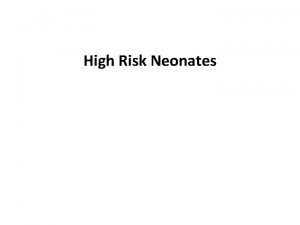Suction pouching in neonate with a stoma case

- Slides: 1

Suction pouching in neonate with a stoma -case study. Seonae Ryu , Yun Jin Lee, Jung- tak Oh, Seok Joo Han, Hye Kyung Chang Department of Pediatric Surgery, Severance Children’s Hospital, Yonsei University College of Medicine Introduction Case study Skin protection is one of the important purpose of the patient’s stoma care. The peristomal skin protection of children is even more important as the skin of children is more fragile than adults. Especially in case of stoma that is close to the enterocutaneous fistula or wound, wound and skin protection are the most influential factor which affects the possible cases of re-operation. According to Christoph franklin , Suction pouch is reported to reduce the frequent dressing change by managing perifistular skin and effectivvely remove effluent by applying it on the enterocutaneous fistula. This 19 day old male baby born to gestational age 38 weeks+5, by cesarean section as 3544 g. The prenatal sonography shows small bowel obstruction. In the 1 st day of birth, bowel perforation was identified in the cologram. He was performed ileostomy. However abdominal distention continued and ileostomy was carried out in the 21 st days of birth on the site of 90 cm below treitz ligament which present ganglion cell. Nursing management The Vasaline gauze was packed on the stoma separated part. Holister 44 mm of Colostomy 2 piece was applied. After applying plate, additional 2 to 3 side holes were made on the 12 Fr. Suction catheter and pouched it Purpose after placint in the ostomy bag. The end of the bag was enclosed in a The purpose of this case study to report the applied case of suction rubber band as well pouch for the wound problem control which occurred during the Suction catheter was connected to wall suction. process of newborn baby’s perioperative stoma care. as suction catheter to prevent the leakage of feces. After suction connection, the interval of dressing change was maintained for 12~24 hours from 4 hours. The stoma took down after 7 days of operation Applying suction pouch after 10 days of operation The granulation tissue began to bud after 13 days of operation. Literature review • A Suction pouch is complex dressing to be managed by specialist. It is one of the effective ways of enterocutaneous fistula management, reducing frequent dressing change, (Frankllin, 2010) • VAC therapy is safe and effective way in pediatric patients. Also it improves wound closure, controls local sepsis, manages fistulae. 2. A stoma accompanied with wound problem requires a critical thinking. 3. The multi-disciplinary team approaching is necessary. 4. The NPWT will help to reduce fasting period by accelarating cell granulation. (pauniaho et al, 2009) Conclusion 1. A suction pouching can be effective method for the children’s complex wound care without complications. It reduces the frequent dressing change. Therefore, it can help to reduce manpower, patient’s pain during dressing change and the possible secondary dermatitis caused by the frequent change of the ostomy plate. Also, slecting appropriate ostomy products are important for children’s wound maintain. Due to the narrow pouching area and the frequent movements of children, flexible plates are suitable. reference Christoph franklin, 2010, The suction pouch for management of simplex or complex enterocutaneous fistulae, Journal of wound ostomy continence nurse Satu-Liisa Pauniaho et al, 2009, Vaccum drainage in the management of complicated abdominal wound dehiscence in children , Journal of pediatric surgery

